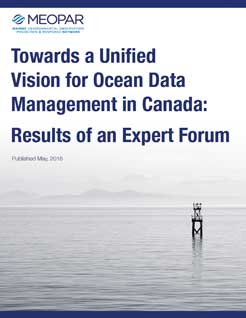New Workshop Report Describes Vision for Ocean Data Management in Canada

Knowledge of the ocean depends on accurate, rich, available and integrated ocean data. Canada has strong regional and federal ocean observing programs, but is one of the few developed coastal nations in the world that has yet to establish a national integrated ocean observing system.
The Council of Canadian Academy's 2013 report on the state of ocean science in Canada noted that, "Canada has several world-class systems for ocean observation and monitoring; however challenges exist in achieving geographical coverage and integration of data management." It is important that Canada's ocean data is leveraged and integrated to best support scientific excellence, foster collaboration and inform stakeholders.
Recognizing the importance and complexity of ocean data management, the Marine Environmental Observation Prediction and Response (MEOPAR) Network supported a Community of Practice established by key stakeholders, and convened an Ocean Data Management Expert Forum connecting experts from across Canada with international experts.
Over fifty participants from government, academia and industry attended the Expert Forum to offer their perspectives and share best practices. Their vision for ocean data management in Canada includes an integrated platform that allows Canadians to benefit from the exemplary science and ocean observation already taking place throughout the country. This vision is captured in the Expert Forum workshop report Towards a Unified Vision for Ocean Data Management in Canada: Results of an Expert Forum.
The report seeks to contribute to a national dialogue about the future integration of ocean data management in Canada and can be used as a tool for policy-makers.
• Canada has strong, regionally based infrastructure for ocean data collection on all three coasts, including the Gulf of St. Lawrence.
• Sufficient resources, innovative technical solutions, a continued willingness to collaborate, and sensible organization and governance decisions will pave the road to a national ocean data infrastructure.
• Progress on a national integrated ocean observing system will rely on an extensive engagement process, including input from the Community of Practice and relevant stakeholder groups.
The workshop report is available for download in English and French.

